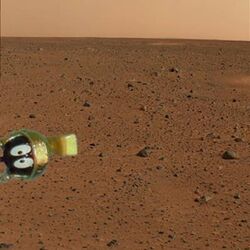Requiem for a Martian
Requiem for a Martian was the eightieth Star Trek episode produced. It is considered to be unspeakably bad anywhere, on any planet, in any dimensional plane. It is in fact, so unabashedly and ineffably putrid that it turns up in ninth- and tenth-generation video copies on the convention circuit.
Origins of the script[edit]
Like many Hollywood writers of the late 1960s, Paul Hamilton was a golf caddy. Specifically, producer Fred Freiberger's golf caddy.
Hamilton had emigrated to the United States from London in 1964. There he worked for the BBC as a writer on several shows, and he was able to eke out a decent living as a television writer in the mid-60s. Gigs dried up when Hamilton became increasingly erratic due to drug use in the Summer of Love and beyond, and by 1969 Hamilton was reduced to working as a golf caddy to make ends meet.
How Hamilton earned the gig of writing Requiem for a Martian is a matter of conjecture to this day. Hamilton's memoir, At the Final Frontier, states that Hamilton had pitched several ideas to Frieberger on the back nine one afternoon in mid 1968, and Frieberger commissioned him on the spot. The commissioning paperwork, however, has never surfaced. Whatever happened, Hamilton was tasked with writing a script that could be filmed as cheaply as possible, using backlot sets and a nearby quarry.
According to Hamilton's book, the script for Requiem for a Martian was written in three days. Frieberger then held the script until May 1969. At that point, with Turnabout Intruder finishing, Frieberger put Hamilton's script into production, one final quick and cheap episode.
Unfortunately, several sets--Sickbay, among others--had already been struck at the time filming commenced.
Plot[edit]
All that is generally known about the episode is that McCoy and Sulu were sent back to late-21st-Century Mars by some sort of temporal accident, and were forced to deal with a frontier mentality,
and Shazzerd,
the last survivor of the native Martian race. Kirk, meanwhile, was thrown into 1890s San Francisco where he was forced to barter for a pocketwatch.
What happened to it[edit]
Requiem For a Martian was broadcast once, on NBC, in July 1969. The mere act of producing and broadcasting it spawned off the infamous Mirror Universe (in ours, a mysterious stranger with an uncanny resemblance to actor Matt Winston [who hadn't even been born] had prevented the episode from being produced, by the simple expedient of feeding the script to a paper shredder before Freiberger had a chance to read it).
What happened in the Mirror Universe? Lawsuits.
Mirror-Hamilton, it turns out, was never paid for his script. No paperwork has ever surfaced to show that he was. It appears that Mirror-Frieberger put into development a script that was never paid for.
This is a very bad thing in Hollywood. Even in the "Mirror" Hollywood.
In retrospect we can say that Hamilton's script (in both universes) was what we would call a "spec script"--a script written not to be produced but to show to producers and agents that the writer is capable of writing a script. We can surmise that Hamilton passed Freiberger the script for Requiem For a Martian on the golf course, and later Frieberger discovered the script, assumed it had been commissioned, and then held onto the script for an open production slot.
Mirror-Hamilton filed suit against Mirror-NBC, Mirror-Desilu, and Mirror-Gene Roddenberry's Mirror-Norway Productions. The judgment in Hamilton v. Desilu et al. awarded Hamilton $12,500 and ownership of the episode. Negotiations by the mirror-syndicators to add Requiem to the package were successful, and it became the most popular episode in the Mirror Universe.
The Conspiracy[edit]
Some Star Trek fans believe there was a vast conspiracy, orchestrated by Roddenberry, to suppress all knowledge that the episode had been filmed.
The reality is, unfortunately, far more complex.
Mirror-Hamilton's own actions ultimately gave him full creative control over the Mirror-Star Trek, and the extreme popularity of the episode made the circulation of copies of the episode so pervasive in his universe, that one early black-and-white videotape bridged the still-young dimensional rift between the universes, and fell into the hands of our Hamilton.
In 1978 our Hamilton, having found the crude tape, published a book, At the Final Frontier, about his experience writing the episode. Roddenberry did file suit against Hamilton for defamation. Hamilton claimed in the book that Roddenberry had actively worked to prevent Requiem from being broadcast or produced, while Roddenberry, by all indications, was unaware it even existed (and the mysterious stranger showed up again at the trial, looking like he hadn't aged a day). A judgment against Hamilton in this case buried the book.
Our Hamilton suffered a stroke and died, at a Star Trek convention in Cleveland, Ohio, in 1985. At the time, he was manning a dealer's table illicitly selling tapes of the episode, and the mysterious stranger was again seen in the vicinity. Despite intensive black-market distribution of tapes and DVDs of the episode (even after Hamilton's death), almost nobody in this universe has ever seen it, as copies of the tape seem to have a habit of disappearing under mysterious circumstances, always with either the aforementioned Matt Winston lookalike, or either of two other mysterious strangers cloely resembling actors Robert Lansing and Teri Garr, turning up nearby. Mirror-Hamilton, on the other hand, became a speechwriter for Mirror-George H. W. Bush, winning him a second term, then for his son, Mirror-George W. Bush, before he was himself elected President of the Mirror-United States.
The episode destroyed the career of Mirror-Kiley (with the result that Mirror-James Brolin got all of his later roles, including the tour narrator in Jurassic Park. Our Richard Kiley was much more fortunate, and went on to appear in Star Trek: Deep Space Nine as stellar engineer Gideon Seyetik in the episode "Second Sight."


